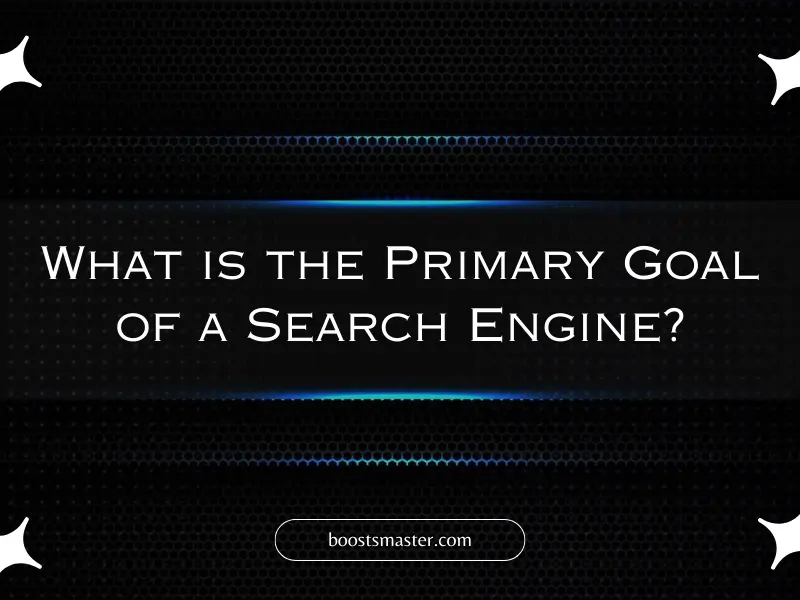Ever since I started working in SEO, I realized how integral search engines are to our daily digital experience—not just for finding simple answers or conducting deep research, but for how we interact with the online world as a whole. They are a vital tool in navigating the vast sea of the internet, and their efficiency truly feels like a blessing when you’re trying to get the best results fast.
Whether someone wants to access information, explore a new website, or improve their chances of higher rankings, the purpose of a search engine is more than it seems. While many just ask a question and expect a quick answer, the primary goal goes much deeper—it’s to serve the most relevant content while aligning with users, businesses, and society’s growing needs.
This article delves into the sophistication, complexity, and the broader implications behind how engines achieve this. It’s amazing how something that seems so simple has become an important part of how people shape their online lives and goals. If you’ve ever wondered how an engine alone can make or break a business’s visibility, then taking a closer look reveals how they ensure we stay connected, informed, and in control.
Understanding the Core Function of Search Engines
The primary goal of search engines is to organize and present information from the vast internet in a way that is accessible and relevant for users. When you search for something, these engines use algorithms to analyze your query and deliver the most useful and high-quality results as quickly as possible. This process involves ranking billions of web pages and understanding the intent behind the words you use.
For example, Google, often seen as the king of search engines, works by continuously updating and optimizing its program to ensure the best possible performance. These updates integrate behavior analysis, keeping the engine’s answers credible and aligned with what people need. As users, we want our queries answered in fractions of a second, and search engines aim to provide that with intricate processes that rank content based on its relevance. The ultimate goal is to serve the most credible and useful content by understanding the question and delivering answers that matter.
Learn more about the significant role search engine optimization plays by visiting our blog, What Is Search Engine Optimization?.
Analyze Primary Goal
Meeting User Intent: The Search Engine’s Mission
When you type a query into a search bar, search engines are on a mission to match that search intent as accurately as possible. The primary goal is to understand the user’s needs behind each query and provide the best possible results. Whether you’re searching for coffee recipes or the health benefits of drinking coffee, search engines work hard to dissect the context behind your keywords and provide specific results. They prioritize delivering the most relevant, accurate information based on your location, device type, language, and even search history.
To achieve this, search engines rely on categorizing search intent into different types: informational, navigational, and transactional. By understanding your intent, they can refine results to address your expectation—whether you’re looking to navigate to a website, find information, or make a purchase.
Delivering High-Quality Results: Trust and Accuracy
The primary goal of a search engine is also to present results that are trustworthy and accurate. Search engines focus on delivering high-quality results based on their evaluation of a website’s Expertise, Authority, and Trustworthiness (E-A-T). When presenting results, search engines assess various factors like the content depth, the authority of the website, and whether the information is up-to-date. For example, when you search for topics like health, finance, or news, search engines want to make sure that the articles they rank are well-cited, comprehensive, and based on reliable sources.
Content quality plays a huge role in this process. Search engines don’t just look for the most relevant keywords but also want to find well-researched and detailed articles that can answer your query thoroughly. That’s why search engines focus on delivering up-to-date, credible information that meets the standards of both users and search engines themselves.
Speed and Accessibility: Instant Results for the Modern User
One of the defining features of modern search engines is the speed at which they deliver results. Whether you’re using a mobile device or a desktop computer, the primary goal of a search engine is to present the most relevant results instantaneously. Search engines are designed to handle the complexity of modern queries and retrieve results quickly by indexing and crawling web pages, which are stored in their database. Advanced algorithms then rank these pages and determine which one should appear first.
However, speed isn’t just about how fast search engines can provide results—it’s also about the user experience. Factors like website speed, mobile-friendliness, and ease of navigation influence how search engines rank pages. If a page is slow to load or difficult to navigate, the search engine might deprioritize it in favor of a faster, more accessible page that better caters to user needs without sacrificing speed.
How Search Engines Achieve Their Goal
Crawling and Indexing
The first step in providing accurate results is crawling. Bots or spiders are used by search engines to explore and collect information from web pages across the internet. They follow links from page to page, gathering content and discovering additional pages. This process is essential because it allows search engines to create an index, which is like a huge structured database that stores information about all the web pages it has visited. By indexing this data, search engines can access it quickly when needed for quick retrieval during searches.
Understanding Queries
When you type a query into a search engine, it doesn’t just look for literal keywords or phrases. Instead, it uses natural language processing (NLP) and machine learning to understand the contextual nuances of the query. This means it can interpret not just the literal meanings but also synonyms, colloquialisms, and even implied meanings. With voice search becoming more common, search engines have also adapted to handle conversational queries and spoken questions, allowing for more natural and multi-turn interactions.
Ranking Algorithms
Once a query is understood, search engines use ranking algorithms to determine the order of results. These algorithms consider various key factors like keyword relevance, backlinks, and user engagement metrics (such as click-through rates, dwell time, and bounce rates). The goal is to provide users with the most relevant and quality content that best matches their query. By evaluating these factors, search engines ensure that the highest-quality web pages are displayed at the top of the results.
Personalization
To make results even more helpful, search engines personalize the results for each user. This means that the results can be adjusted based on factors like search history, previous queries, and geolocation. For example, if you’re searching for a restaurant, the search engine might show you options that are closer to your current location. Additionally, device-specific optimization ensures that the results are tailored for mobile or desktop devices, improving the user experience based on the device being used.
Challenges in Achieving the Primary Goal
Search engines face several challenges when trying to meet the primary goal of delivering accurate, relevant, and trustworthy results. One major issue is the balance between personalization and user privacy. As search engines work to improve relevance by using data usage policies, they must also manage privacy concerns and respect privacy controls. Another challenge comes from the growing amount of misinformation, false information, and low-quality content on the web, which can affect the accuracy and credibility of search results.
Search engines continuously innovate to combat this by refining algorithms that prioritize credible sources and trustworthiness. However, the technological evolution in fields like voice search, image recognition, and AI-driven assistants brings new difficulties in ensuring growth and enhancement without compromising transparency or suppression of information. The need for constant adaptation to meet user expectations and demands means search engines must keep advancing while maintaining a clear control over the quality of results.
The Impact of Search Engines on the Digital World
Search engines play a profound role in shaping the digital ecosystem. They help users find the answers they need by connecting them to relevant content. This process has a major influence on content creation, where bloggers, publishers, and businesses create material that is optimized to rank higher in search results.
Search engine optimization (SEO) has become an essential tool, guiding businesses to follow best practices to increase visibility. This, in turn, boosts economic activity by enabling global connectivity and facilitating the flow of information across different linguistic and geographic divides. The impact is not just limited to organic results but also includes paid advertising, like Google Ads, which serves as a revenue source for companies. Search engines are not only driving economic growth but are also enabling businesses to reach a global audience, connecting customers to the content they seek.
If you’re unsure how to structure compelling blog posts, our WordPress Website Development Services can help you establish a professional, SEO-friendly online presence.
What Do You Need to Keep in Mind When Doing SEO?
On-Page SEO
On-page SEO is one of the most important aspects of a successful SEO campaign. It’s all about optimizing your web page content to meet Google’s SEO standards. To achieve this, you need to focus on keywords, make sure your images are properly sized, and use alt-tags for better optimization. Additionally, optimized headings, internal link structures, and a well-organized HTML structure play a huge role in ranking your content higher. The content creation you do should be high-quality and targeting the right audience. I’ve seen many businesses getting started with SEO struggle in this area, but once you balance on-page SEO properly, you see real improvements in your rank.
Off-Page SEO
Then, there’s off-page SEO, which is equally important. It involves outreach and building backlinks from reputable sources. You can do this through methods like guest-posting on blogs, local citations, or even promoting your content on social media platforms. Having these elements connected and consistent across industries will help boost your website’s visibility. I’ve worked with several companies who decided to outsource this part of the campaign to an SEO agency, which resulted in a better SEO campaign overall. It’s not just about building links—it’s about building trust and reputation management.
Analytics
Analytics play a crucial role in monitoring and improving your SEO campaign. Using detailed analytics, you can track your statistics, results, and your rankings over time. It’s important to stay involved and monitor competitor activity to ensure you’re on track to claim that #1 spot. Sometimes, you’ll need to fix or change things, but it’s all part of an ongoing process. In my experience, managing SEO is a full-time job, and balancing these aspects can be challenging, but the rewards are definitely beneficial in the long run.
Conclusion
The primary goal of search engines is to provide relevant, high-quality results to users as they conduct searches. They strive to do this quickly and efficiently, making sure the user intent is fully understood and met. With advanced technologies and a user-centric design, search engines continuously evolve to improve their precision and speed, ensuring users can easily find information, whether they are looking for simple searches or tackling more complex ideas.
They are powerful tools and gateways that connect us to the vast knowledge on the web, and their purpose is to empower us by transforming how we interact with the digital landscape. As they harness the full potential of modern processes, their mission is to deliver results that keep up with continuous innovation. By appreciating the mechanics and purpose of search engines, we can marvel at how they help us navigate the ever-changing digital world, where every search becomes an opportunity for success.
FAQs
What is the primary goal of a search engine?
The primary goal of a search engine is to help people find the right information that meets their needs. It’s all about providing relevant results based on a user’s search query. Whether you’re searching for images, videos, or documents, the goal is to make sure the information you find is high-quality, relevant, and answers your question.
How do search engines know what to show?
Search engines use algorithms to sort and rank the web pages and content they have crawled and indexed. These algorithms are designed to evaluate quality and relevance of content, ensuring that users get the best results. Every time a search query is made, the engine matches it to stored information and decides which pages are the most useful for the inquiry.
Why do search engines change their results so often?
Search engines guarded by complex systems frequently change their results to keep up with new trends, information, and searcher inquiries. This constant change ensures that the primary function—to deliver relevant and high-quality content—is maintained. As search engines adapt, they improve their ability to help people find what they need.
Can marketers use search engines to increase website visibility?
Yes, search engines are a powerful tool for marketers. By using SEM (Search Engine Marketing), including techniques like paid search and organic search rankings, marketers can increase their website’s visibility and attract more audience visits. The better the ranking, the more likely users will find the content, helping the website grow.




